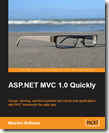Sample chapter from ASP.NET MVC 1.0 Quickly
Edit on GitHub  Here’s a shameless, commercial blogpost… With yesterday’s 1.0 release of the ASP.NET MVC framework, I’m sure the following sample chapter from my book ASP.NET MVC 1.0 Quickly will be of use for people starting ASP.NET MVC development: Your first ASP.NET MVC application.
Here’s a shameless, commercial blogpost… With yesterday’s 1.0 release of the ASP.NET MVC framework, I’m sure the following sample chapter from my book ASP.NET MVC 1.0 Quickly will be of use for people starting ASP.NET MVC development: Your first ASP.NET MVC application.
When downloading and installing the ASP.NET MVC framework SDK, a new project template is installed in Visual Studio. This chapter describes how to use the ASP.NET MVC project template that is installed in Visual Studio. All ASP.NET MVC aspects are touched briefly by creating a new ASP.NET MVC web application based on this Visual Studio template. Besides view, controller, and model, new concepts including ViewData—a means of transferring data between controller and view, routing—the link between a web browser URL and a specific action method inside a controller, and unit testing of a controller are also illustrated here.
In this chapter, you will:
- Have an overview of all the aspects of an ASP.NET MVC web application
- Explore the ASP.NET MVC web application project template that is installed in Visual Studio 2008
- Create a first action method and corresponding view
- Create a strong-typed view
- Learn how a controller action method can pass strong-typed ViewData to the view
- Learn what unit testing is all about, and why it should be used
- Learn how to create a unit test for an action method by using Visual Studio's unit test generation wizard and modifying the unit test code by hand
Download the free sample chapter here. Or order the full book, here. That’s a better option ;-)
By the way, if you are interested in the book writing process itself, check my previous blog post on that.
This is an imported post. It was imported from my old blog using an automated tool and may contain formatting errors and/or broken images.



6 responses